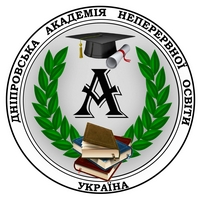CHANGE MANAGEMENT IN THE CONTEXT OF PROFESSIONAL DEVELOPMENT OF TEACHERS IN A GENERAL SECONDARY EDUCATION INSTITUTION
Abstract
The article is devoted to solving the problem of change management in the context of professional development of teaching staff. The relevance of the research topic is due to the need for active professional development of teachers to develop the ability to respond to changes and work effectively in the face of change to improve the quality of the educational process. The article analyses important scientific achievements in the theory of change management and problems of professional development of teachers in domestic and foreign management. The definition of "change management in the context of professional development of teachers in general secondary education institutions" is presented as a continuous process of implementing and regulating a single line of behaviour of teachers in terms of perception of changes using tactics of support and involvement in continuous professional development in an active motivational educational environment. It has been established that change management in the context of teachers’ professional development has its own specific features, including the availability of an algorithm, development of change management technology, establishment of information channels, and use of knowledge management mechanisms for teaching staff. In this way, change management becomes a holistic process that includes many interrelated elements and is impossible without the active participation of teachers, who are key agents of change in the educational process. The article presents the results of a study of the level of professional development of teachers based on the theory of change management. A factor-criterion model for assessing the status of management of professional development of teachers in the context of changes is proposed. Based on the general structure of the head of an educational institution, the content and specificity of management activities, we have identified the factors of management of the professional development of teachers of the EI, namely: planning and prognostic activities for the organisation of monitoring, diagnostic, informationanalytical, motivational and targeted, organisational and coordination, control and diagnostic, and regulatory and corrective activities. The results of the study on teachers’ satisfaction with their participation in the implementation of changes are presented. The factors influencing the self-development of teachers are identified. Prospects for further research include the development of tools for assessing the effectiveness of managing the development of GSEI in the context of change in order to justify and choose a strategy for the development of the organisation.
References
2. Адізес І. Управління змінами для досягнення найліпшого результату в бізнесі й повсякденному житті; пер. з англ. Т. Семингіної. Київ: Форс, 2018. 400 с.
3. Боднар О. Горішна О. Механізми подолання опору змінам у закладах загальної середньої освіти. Наукові записки Тернопільського національного педагогічного університету імені Володимира Гнатюка. Серія: Педагогіка. 2020. № 2.
С. 180–189. URL: http://nzp.tnpu.edu.ua/issue/archive (дата звернення: 07.02.2022).
4. Кравченко Г. Ю. Адаптивне управління розвитком інститутів післядипломної педагогічної освіти в Україні: монографія. Харків, 2015. 300 с.
5. Кравченко Г., Чернігівська Я. Управління розвитком людського потенціалу педагогічного колективу освітнього закладу на основі адаптивного управління розвитком. Імідж сучасного педагога. Полтава: ОІППО, 2017. № 7 (176). С. 16–18.
6. Островерхова Н. В. Теоретичні засади організаційних механізмів управління навчальним процесом. Теорія та методика управління освітою. 2012. № 9. С. 1–16. URL: http://lib.iitta.gov.ua/6531/1/27.pdf (дата звернення: 03.03.2022).
7. Петрова І., Поліщук В., Печенізький В. Управління змінами: навч. посібник. Львів: ЗУКЦ, 2008. 66 с.
8. Поняття про управління, менеджмент, внутрішкільне управління, педагогічний менеджмент. URL: http://readbookz.com/book/172/5536.htm (дата звернення: 10.01.2022).
9. Пуховська Л. Теоретичні засади професійного розвитку педагогів: рух до концептуальної карти. Порівняльна професійна педагогіка: 2011. № 1. URL: http://khnu.km.ua/root/res/2-7001-31.pdf (дата звернення: 16.01.2022). URL: http://lib.iitta.gov.ua/2564/1 (дата звернення: 16.01.2022).
10. Турчіна С. Г. Управління змінами в контексті стратегічного розвитку підприємств. Вісник Сумського національного аграрного університету. Серія: Економіка і менеджмент. 2016. Вип. 1. С. 11–15. URL: http://nbuv.gov.ua/UJRN/Vsna_
ekon_2016_1_4 (дата звернення 19.01.2022).
11. Фединець Н. І. Управління змінами в організації. Національний лісотехнічний університет України. Збірник науково-технічних праць. С. 292–298. URL: https://nv.nltu.edu.ua/Archive/2011/21_15/287_Ste.pdf (дата звернення: 01.09.2020).
12. Хриков Є. М. Управління навчальним закладом: навч. посіб. Київ, 2006. 365 с.
13. A Quick-and-Dirty Guide to Change Management Team Structure. Walk me. The change management blog. Update 2021. (назва з екрану). URL: https://change.walkme.com/change-management-team-structure/ (дата звернення: 02.09.2022).
14. Bodnar O., Boyko M., Horishna O., Naumchuk V. Conceptual essence of change of management models in the educational environment: theory and practice. ALR Journal. 2021. 5 (8). С. 26–35. URL: https://alrjournal.com/jvi.aspx?un=ALRJ-
75547&volume (дата звернення: 17.02.2023).
15. Hannan M. Structural Inertia And Organizational Change. American Sociological Review. April 1984. № 49 (2). URL: https://www.researchgate.net/publication/228314327_Structural_Inertia_And_Organizational_Change (дата звернення: 16.02.2023).

 ISSN
ISSN  ISSN
ISSN 

